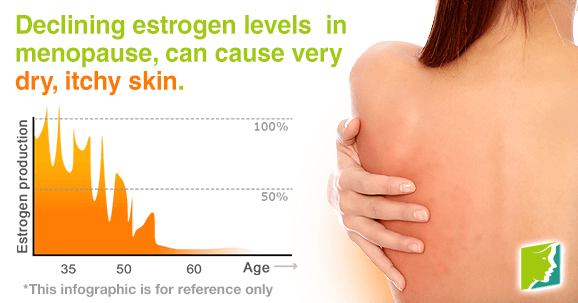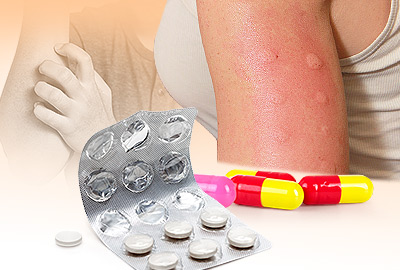Sure, you've heard of hot flashes, mood swings, and irregular periods. But did you know menopause can also cause dry, itchy skin? Hormonal changes can lead to a host of skin problems, some beginning as early as perimenopause. Keep reading to learn more about itchy skin during menopause.
What Causes Dry, Itchy Skin during Menopause?
Most people are unaware that estrogen plays a key role in maintaining healthy skin. While estrogen is most well-known for its role in female reproduction, it also stimulates the production of skin collagen, a compound that provides support to skin and other tissues. This is why many pregnant women, who have more estrogen than normal, often seem to have skin that 'glows.'
When you enter menopause, your estrogen levels start to fluctuate before beginning a steady decline that they won't stabilize from until you reach postmenopause. Your collagen production follows this decline, leading to less resilient skin tissue. At the same time, declining estrogen levels also lessen your body's ability to retain moisture and produce skin oils. Taken together, these can cause some very dry, itchy skin.
How to Relieve Itchy Skin
So now that you know what causes itchy skin during menopause, how do you stop it? Treating dry skin can take a combination of lifestyle changes and natural remedies. Things that can help you improve your skin include:
Omega 3 fatty acids
The compounds promote healthy skin, and can easily be added to your diet. Omega 3 can be found in foods like salmon, walnuts, sardines, flaxseed and soy products.
Water
Drinking plenty of water will help to keep your body hydrated and skin moisturized. The usual recommended about is about 8 glasses a day, but it depends on the individual woman.
Good shower techniques
Take short, warm - not hot - showers, use gentle soaps, and be sure to moisturize after you're done. Hot water can be rough on your skin and strip it of its protective oils, as can harsh, scraping soaps.
Avoid tanning beds
A little sun is good for your skin, and you can use sunscreen if you're outside for a long time. However, you should avoid tanning beds, which have been linked with a number of serious skin issues and skin cancer.
Creams
Lotions and creams, particularly those that target eczema, can be helpful for relieving itching and skin rash that may have come from scratching.
If lifestyle changes are not enough, you may want to consider natural supplements that address your hormonal imbalance. These can include both estrogenic and non-estrogenic herbs. Talk to your doctor if symptoms persist or become more severe despite your efforts.
Click on the following link to learn more about treatments for itchy skin during menopause.
Sources
- Hutchinson, Susan M.D. "The Stages of a Woman's Life: Menstruation, Pregnancy, Nursing, Perimenopause, Menopause." November 2007.
- Love, Susan M.D. Menopause and Hormone Book. New York: Three Rivers Press, 2003.
- BMJ Group. "Menopause: What is it?" Patient Leaflet. 2007




